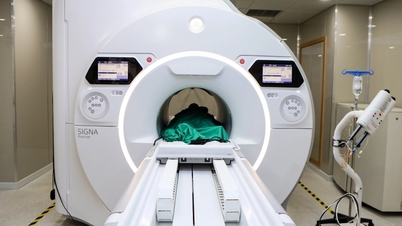Ms. NGTH (29 years old, in Ho Chi Minh City), newly married, was under severe stress due to changes in living environment and work. When she went to the hospital for examination, she was tired, had to urinate frequently, and her blood sugar level exceeded the threshold for diabetes diagnosis.
It is known that Ms. H. often suffers from insomnia, irregular eating habits, and eats a lot of sweets and soft drinks when stressed. Notably, before that, the patient had no obvious risk factors other than stress.
Similarly, Mr. LTL (35 years old, office worker), experienced many months of work pressure, often working at night, irregular eating, little sleep. Mr. L. came to the doctor because of weight loss and prolonged fatigue, test results showed high blood sugar. The patient almost could not believe that he had diabetes at this age.

If stress persists, cortisol levels remain high and disrupt glucose metabolism, leading to increased blood sugar.
PHOTO: AI
Master - Doctor Hoang Thi Bich Ngoc, Department of Examination, Gia An 115 Hospital (HCMC) said that type 2 diabetes is showing a tendency to get younger. If in the past most patients were over 50 years old, now it is not rare for people in their 30s to be diagnosed with the disease. In particular, stress is an important factor that is often overlooked or ignored.
How does stress affect blood sugar?
According to Dr. Bich Ngoc, when the body is stressed, whether due to mental pressure, anxiety, lack of sleep or physical illness, the brain will activate the hypothalamus-pituitary-adrenal axis. This mechanism causes the body to secrete the hormones cortisol, adrenaline and glucagon. These are “stress hormones” that help cope with stressful situations by:
- Increases the breakdown of glycogen in the liver into glucose, which is released into the blood to provide quick energy to the brain and muscles.
- Inhibits the effects of insulin, causing cells to absorb sugar less well.
The result is a temporary increase in blood sugar - a normal physiological reaction. However, Dr. Bich Ngoc said that when the body is constantly in a state of stress, the hormone cortisol will increase, causing the process of sugar and fat metabolism to be disrupted. Over time, insulin no longer works effectively, causing insulin resistance - a prerequisite for type 2 diabetes.
Diabetes develops silently but rapidly in young people
In terms of symptoms, young people with Diabetes is often harder to detect than in middle-aged people. They have fewer typical symptoms such as thirst, frequent urination or obvious weight loss, so the disease is often detected late, only by chance during a health check or when complications appear.
According to Dr. Bich Ngoc, the worrying difference is that the disease progression in young people is often silent but faster. Due to the early onset of the disease, the prolonged exposure to high blood sugar, the risk of vascular complications, especially cardiovascular, renal and retinal, can appear much earlier than in middle-aged people.
In terms of treatment, young people often respond better to insulin and medication, but the big challenge lies in compliance. Due to the nature of their work, active lifestyle and lack of concern for their health, young people often neglect blood sugar monitoring, eat irregularly or stop taking medication when they feel “well again”. This makes blood sugar control less stable, creating conditions for complications to develop early.
“Psychological factors also have a significant impact. Many young patients feel self-conscious, thinking that they have an ‘old person’s disease’, or are subjective because they think that because they are young, the disease will not be serious. Therefore, in treatment, in addition to controlling blood sugar, doctors need to provide psychological counseling and guidance on appropriate lifestyle adjustments, helping them accept and manage the disease long-term,” Dr. Bich Ngoc advised.

Do at least 30 minutes of light exercise every day: Cycling, walking, yoga or gardening. Physical activity helps control blood sugar and improves mood.
Photo: AI
What should I do to control stress effectively?
According to doctors, when treating diabetic patients, stress control is as important as controlling diet or taking medication. Patients should start with small, realistic changes that can be maintained in the long term:
- Do at least 30 minutes of light exercise every day: Cycling, walking, yoga or gardening. Physical activity helps the body release endorphins - the "happy hormones" - which help control blood sugar and improve mood.
- Get 7-8 hours of sleep every night: Avoid staying up late because lack of sleep will increase cortisol - the stress hormone - and lead to increased blood sugar. Limit the use of phones and social networks before bed to avoid nerve stimulation.
- Identify and relieve stress: For people who often worry, you can practice deep breathing, meditation or keep an emotional diary.
- Maintain social contact: Sharing with relatives, friends or a diabetes support group also helps patients reduce feelings of isolation and increase motivation for treatment.
“Most importantly, patients need to understand that stress is a natural reaction of the body, which cannot be completely eliminated, but can be managed and controlled if they know how to listen to their body, maintain a moderate lifestyle and maintain a positive connection with the surrounding environment,” said Dr. Bich Ngoc.
Source: https://thanhnien.vn/thuong-xuyen-song-trong-stress-coi-chung-mac-tieu-duong-som-185251113221838754.htm


![[Photo] Special class in Tra Linh](https://vphoto.vietnam.vn/thumb/1200x675/vietnam/resource/IMAGE/2025/11/14/1763078485441_ndo_br_lop-hoc-7-jpg.webp)

![[Photo] Unique art of painting Tuong masks](https://vphoto.vietnam.vn/thumb/1200x675/vietnam/resource/IMAGE/2025/11/14/1763094089301_ndo_br_1-jpg.webp)

![[Photo] Deep sea sand deposits, ancient wooden ship An Bang faces the risk of being buried again](https://vphoto.vietnam.vn/thumb/1200x675/vietnam/resource/IMAGE/2025/11/13/1763033175715_ndo_br_thuyen-1-jpg.webp)





























































































![Dong Nai OCOP transition: [Article 3] Linking tourism with OCOP product consumption](https://vphoto.vietnam.vn/thumb/402x226/vietnam/resource/IMAGE/2025/11/10/1762739199309_1324-2740-7_n-162543_981.jpeg)






Comment (0)